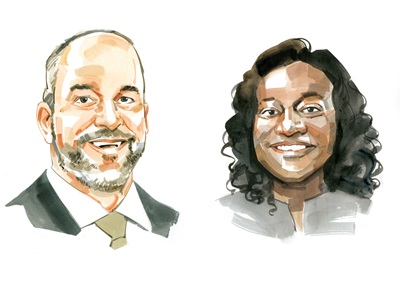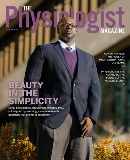Relationship Building
How to make the most of networking as a graduate student.

Each issue we ask a trainee to pose their career questions to an established investigator and mentor. Here, Yemi Semola, a graduate teaching assistant in veterinary and biomedical sciences at Oklahoma State University in Stillwater, asks Craig A. Emter,
PhD, an associate professor at the University of Missouri in Columbia, about networking as a graduate student, particularly in a virtual world.
Q: How do you actually go about networking and holding conversation with someone from a different field of research?
A: Get them talking. I introduce myself and then get my colleague to discuss their area of expertise. It facilitates the identification of areas where our research expertise overlaps or is complementary. Be an engaged listener
and the new collaboration will take care of itself!
Q: In what ways can I as a graduate student promote physiology and present at Experimental Biology (EB) to fellow graduate students who are not in the same field as me?
A: Know the societies well. Then, when you are casually having a conversation with a fellow graduate student from another research area you can say, “You know, I bet the Gastrointestinal Liver Section (or insert appropriate
society or section here) of the American Physiological Society would be really interested in your project. Have you ever considered submitting your work to Experimental Biology?”
Q: With the cancellation of physical conferences because of the pandemic, in what ways can I obtain the same benefits from a virtual conference? What is APS doing to ensure this?
A: APS is doing a great job of providing as interactive an experience for EB 2021 online as they possibly can. I encourage trainees to attend the live featured topics and symposia and ask questions during the sessions.
Attendees can also leave notes and comments at the posters on message boards. Don’t be afraid to go a step further; if your question does not get answered during specific live sessions, write it down and contact the presenter in a personal email
to set up a phone call or online meeting. Trouble-shoot your normal ways of networking to adapt and ensure the experiences and interactions you normally expect at an in-person meeting happen during the virtual meeting or at a later time after
the conference has ended.
Got a career question you’d like to submit? Email it to education@physiology.org. We may use it in an upcoming Mentoring Q&A.
This article was originally published in the March 2021 issue of The Physiologist Magazine.
The Physiologist Magazine
Read the Latest Issue
Don’t miss out on the latest topics in science and research.
View the Issue Archive
Catch up on all the issues of The Physiologist Magazine.
Contact Us
For questions, comments or to share your story ideas, email us or call 301.634.7314.
Trouble-shoot your normal ways of networking to adapt and ensure the experiences and interactions you normally expect at an in-person meeting happen during the virtual meeting or at a later time after the conference has ended.


